Dividend Growth
The DSM Dividend Growth strategy seeks long-term capital appreciation through investments in dividend paying stocks of quality US and international companies. We select portfolio holdings based on their presentation of strong growth characteristics combined with share prices that represent attractive returns.
The strategy generally invests in 25 to 35 companies operating among North America, Europe, other developed and emerging markets. The strategy generally maintains a dividend yield between 1.5% and 2.5% and uses no leverage, futures, options or derivatives. Currency exposure is unhedged.
The Dividend Growth strategy is available in:
- Managed Accounts
- CIF (can be made available)
- Chart
- Tables
- Notes

Periods ending June 30, 2024
| June* | QTD* | Trail 12M* | 3 Years* | 5 Years* | Cumulative Since Inception*^ | Annualized Since Inception*^ | |
|---|---|---|---|---|---|---|---|
| Pre-Fee | 6.14% | 6.68% | 34.48% | 7.54% | 13.88% | 441.07% | 13.41% |
| Post-Fee | 6.14% | 6.50% | 33.61% | 6.85% | 13.15% | 383.02% | 12.46% |
| Russell 1000 Total Return | 3.31% | 3.57% | 23.88% | 8.74% | 14.61% | 435.56% | 13.32% |
| MSCI ACWI Net Total Return | 2.23% | 2.87% | 19.38% | 5.43% | 10.76% | 210.43% | 8.81% |
Annual Periods ending June 30, 2024
| DSM Pre-Fee | DSM Post-Fee | Russell 1000 Total Return | MSCI ACWI Net Total Return | |
|---|---|---|---|---|
| Quarterly | ||||
| Second Qtr* | 6.68% | 6.50% | 3.57% | 2.87% |
| First Qtr* | 13.08% | 12.90% | 10.30% | 8.20% |
| Yearly | ||||
| 2024* | 20.64% | 20.24% | 14.24% | 11.30% |
| 2023 | 18.94% | 18.18% | 26.53% | 22.20% |
| 2022 | -18.19% | -18.73% | -19.13% | -18.36% |
| 2021 | 20.07% | 19.31% | 26.45% | 18.54% |
| 2020 | 25.07% | 24.29% | 20.96% | 16.25% |
| 2019 | 34.25% | 33.32% | 31.43% | 26.60% |
| 2018 | -8.87% | -9.78% | -4.78% | -9.42% |
| 2017 | 37.76% | 36.43% | 21.69% | 23.97% |
| 2016 | 0.78% | -0.25% | 12.05% | 7.86% |
| 2015 | 7.24% | 6.19% | 0.92% | -2.36% |
| 2014 | 3.96% | 2.96% | 13.24% | 4.16% |
| 2013 | 34.59% | 33.33% | 33.11% | 22.80% |
| 2012 | 19.08% | 17.90% | 16.42% | 16.13% |
| 2011 ^ | 1.14% | 0.25% | -0.88% | -8.78% |

GENERAL PERFORMANCE COMPOSITE FOOTNOTES
- Past performance is no guarantee of future results and individual accounts and results will vary. Materially different market or economic conditions could result in markedly different performance, including the possibility of loss. The content presented is for informational purposes only. It is not intended to reflect a current or past recommendation, investment, legal, tax or accounting advice of any kind, or a solicitation of an offer to buy or sell any securities or investment services. Except as otherwise specified, any companies, sectors, securities and/or markets discussed are solely for illustrative purposes regarding economic trends and conditions or investment process and may or may not be held by DSM Capital Partners LLC (“DSM”) or other investment vehicles or accounts managed by DSM. Investing entails risks, including possible loss of principal. There are also special risk considerations associated with international and global investing (especially emerging markets), small and mid-capitalization companies, or other growth and/or concentrated investment strategies.
- DSM, located in Palm Beach Gardens, Florida, is an investment adviser registered with the Securities and Exchange Commission under the Investment Advisers Act of 1940, as amended, managing separate accounts, pooled investment vehicles and wrap accounts for both institutional and high net worth investors.
- DSM primarily manages equities in a model portfolio method and therefore presents a single composite return for managed accounts of each strategy offered. In general, the Dividend Growth strategy will invest in equity securities without regard to market capitalization. Equity securities, as determined by DSM in its discretion include, but are not limited to, common stocks, preferred stocks, securities convertible into common stocks, rights and warrants. The Dividend Growth strategy has no limit on the proportion of assets it can invest in equity securities of domestic versus foreign companies. A large capitalization company for this portfolio is one that has a market capitalization of U.S. $10 billion or more at the time of purchase. The Dividend Growth strategy generally will contain 25 to 35 equity securities. The Dividend Growth strategy was formerly called the Global Dividend Growth strategy and the Global Growth and Income strategy prior to that. The Dividend Growth name changed occurred on December 1, 2021.
- DSM claims compliance with the Global Investment Performance Standards (GIPS®) and has prepared and presented this report in compliance with the GIPS standards. DSM has been independently verified for the periods January 2002 – December 31, 2023. A firm that claims compliance with the GIPS standards must establish policies and procedures for complying with all the applicable requirements of the GIPS standards. Verification provides assurance on whether the firm’s policies and procedures related to composite, as well as the calculation, presentation, and distribution of performance, have been designed in compliance with the GIPS standards and have been implemented on a firm-wide basis. The Dividend Growth Composite (formerly the Global Dividend Growth strategy) has had a performance examination for the periods February 2011 to December 31, 2023. The verification and performance examination reports are available upon request. Benchmark returns are not covered by the report of independent verifiers.
- DSM’s performance composite includes all discretionary Dividend Growth managed accounts. The composite was created February 1, 2011. A complete list of composites descriptions, a list of pooled funds descriptions for limited distribution pooled funds, and a list of broad distribution pooled funds are available upon request, as well as policies for valuing portfolios investments, calculating performance, and preparing GIPS Reports, may be requested from Russell Katz, DSM Capital Partners LLC, 7111 Fairway Drive, Suite 350, Palm Beach Gardens, Florida 33418. Phone: 561-618-4000; email: [email protected].
- DSM first offered the Dividend Growth strategy to clients during February of 2011. There is one pooled investment vehicle in the composite from the partial year of 2011 to present.
- Performance is presented in US Dollars. Results are time-weighted and asset-weighted based on beginning-of-period asset values. Valuation is on a trade-date basis. Results include the reinvestment of dividends and other earnings. Dividends are realized on an accrual basis; cash equivalent dividends are realized on a cash basis. Composite returns are net of withholding taxes on foreign dividends. As of March 2017, reclaimed withholding taxes are recognized as income when received. Pre-fee results include the effect of commissions; post-fee results include the effect of commissions and management fees. Custody charges, where applicable, are not deducted from gross and net-of-fee performance. The 36-month annualized standard deviation measures the variability of the composite net of fees and the benchmark returns over the preceding 36-month period. The 36-month standard deviation is not shown for periods comprising fewer than 36 monthly returns. Dispersion between accounts is the asset-weighted standard deviation of gross returns for active accounts with DSM for the entirety of a given year. Dispersion is only reported for years having five or more such accounts. Additional information regarding policies for calculating and reporting returns is available upon request.
- DSM’s management fee for the Dividend Growth strategy is generally 0.65% per annum on the first $25 million of assets, 0.60% on the next $25 million, 0.55% on the next $50 million, 0.50% on the next $100 million and 0.45% on amounts thereafter. DSM’s advisory fees are fully detailed in Part 2A of its Form ADV. This fee is charged quarterly in arrears. Certain accounts, if any, in the composite may have different fee structures and certain accounts may involve non-fee expenses not included above. The performance figures presented do not reflect the deduction of investment advisory fees actually charged to the account in the composite. Rather, the performance results presented reflect the deduction of a model advisory fee. From inception of the composite on February 1, 2011 through March 31, 2019, a model advisory fee of 1.0% per annum for Dividend Growth had been used. From April 1, 2019, the model advisory fee used is 0.65% per annum. From inception through December 31, 2016, DSM calculated monthly post-fee performance by applying one-third of the quarterly model fee to each month of a quarter. As of January 1, 2017, DSM calculates post-fee returns by deducting the entire quarterly model fee in the first month of the quarter, with no fee deduction in the second and third month of the quarter. Quarterly post-fee returns based on beginning-of-quarter market values may compound to more or less than monthly post-fee returns based on beginning-of-month market values.
- The Russell 1000 Total Return Index measures the performance of the large-cap segment of the US equity universe. It is a subset of the Russell 3000 Index and includes approximately 1,000 of the largest securities based on a combination of their market cap and current index membership. The Russell 1000 represents approximately 93% of the US market. The Russell 1000 Index is constructed to provide a comprehensive and unbiased barometer for the large-cap segment and is completely reconstituted annually to ensure new and growing equities are included. DSM also presents the performance of the MSCI ACWI Net Total Return, which is a return type for the MSCI All Country World Index (ACWI), a stock index that tracks the performance of equity markets in developed and emerging countries. This index is maintained by Morgan Stanley Capital International (MSCI) and is considered an important benchmark for measuring the global health of the markets. The volatility of a benchmark may be materially different from the individual performance attained by a specific client investing within this strategy, and the holdings of the accounts contained within the composite may differ significantly from the securities that comprise the benchmark. Indices are not assessed a management fee and investors cannot directly invest in an index.
- Leveraged accounts, if any, in the composite involve non-discretionary leverage only. In such cases, per GIPS recommendations, the effect of leverage is removed by treating borrowing as a cash flow and adding back margin interest.
- There have been no material changes in the persons responsible for the investment management of the Dividend Growth strategy since its inception.
GIPS® is a registered trademark of CFA Institute. CFA Institute does not endorse or promote this organization, nor does it warrant the accuracy or quality of the contained herein.
Revised: 07/17/2024

